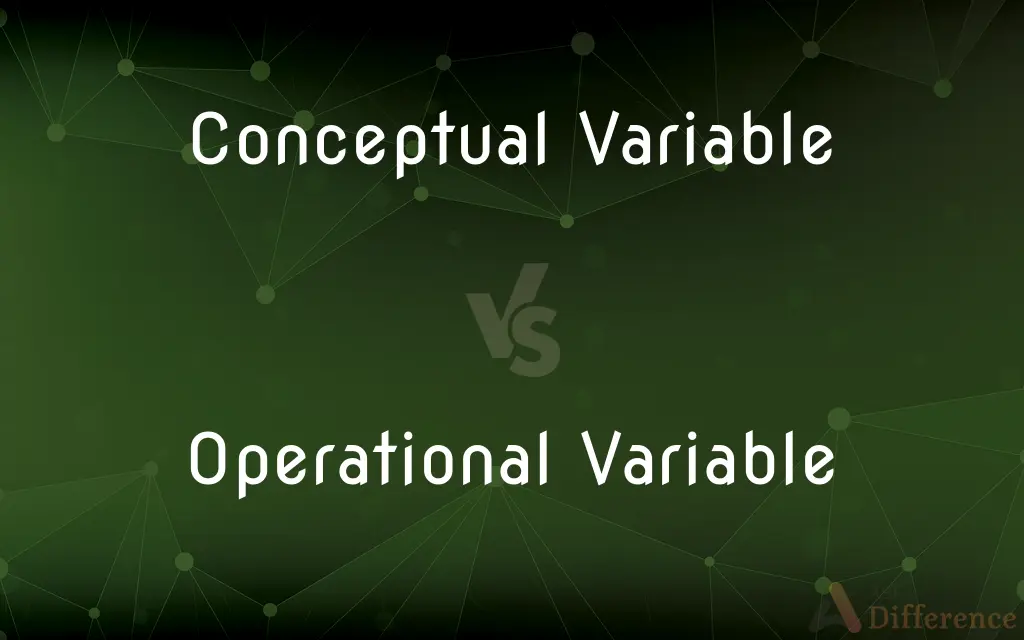Conceptual Variable vs. Operational Variable — What's the Difference?
By Urooj Arif & Maham Liaqat — Published on October 27, 2024
Conceptual variables are abstract ideas or constructs that are not directly measurable, like happiness or intelligence, while operational variables define how those concepts are quantitatively measured, such as a happiness score on a survey.

Difference Between Conceptual Variable and Operational Variable
Table of Contents
ADVERTISEMENT
Key Differences
Conceptual variables represent theoretical constructs that are often subjective and not directly observable. These variables embody the essence of what researchers aim to study, such as motivation, stress, or social support. They are the starting point for any research, providing a broad definition of what the researcher intends to explore. For instance, "stress" might be conceptualized as the level of discomfort a person feels in response to external pressures.
Operational variables, on the other hand, translate these abstract concepts into measurable factors. This involves defining the variable in terms of specific, observable, and measurable actions or attributes that can be quantitatively assessed. For example, "stress" could be operationally defined by the number of stress-related symptoms reported by an individual on a standardized questionnaire. This transformation allows for empirical testing and analysis.
The transition from conceptual to operational variables is crucial for research design, enabling hypotheses to be tested through the collection of data. While conceptual variables offer a theoretical framework, operational variables bridge the gap to empirical evidence, dictating how data will be collected, what instruments will be used, and how measurements will be interpreted.
This process also highlights the importance of validity and reliability in research. The operational definition must accurately capture the essence of the conceptual variable it represents. If the operational variable is poorly defined or measured, it may not validly or reliably reflect the conceptual variable, leading to errors in research findings.
Understanding the difference between these two types of variables is essential for both conducting and evaluating research. It ensures clarity in what is being studied (conceptual) and how it is being studied (operational), facilitating communication of research methods and findings within the scientific community.
ADVERTISEMENT
Comparison Chart
Definition
Abstract ideas that are not directly measurable
Specific methods used to measure or indicate a conceptual variable
Nature
Theoretical and subjective
Practical and objective
Purpose
To outline what is to be studied
To detail how the study will be conducted
Examples
Intelligence, happiness, motivation
IQ test results, happiness score on a survey, number of tasks completed
Role in Research
Provides a theoretical framework
Enables empirical testing and data collection
Compare with Definitions
Conceptual Variable
Not directly observable or measurable.
Well-being, as a conceptual variable, reflects an individual's overall happiness and life satisfaction.
Operational Variable
Practical representation of conceptual variables.
An operational variable for intelligence might be the score on an IQ test.
Conceptual Variable
Forms the basis of research hypotheses.
The study's hypothesis was based on the conceptual variable of social support.
Operational Variable
Must be valid and reliable to be effective.
The operational variable for happiness was validated through multiple surveys.
Conceptual Variable
Abstract, theoretical constructs.
Intelligence is a conceptual variable that encompasses cognitive abilities.
Operational Variable
Specifies how variables are measured or manipulated.
Exercise frequency was the operational variable for physical activity.
Conceptual Variable
Guides the direction of research.
Exploring the conceptual variable of creativity led to diverse operational definitions.
Operational Variable
Facilitates data collection and analysis.
Using blood pressure readings as an operational variable allowed for objective health assessment.
Conceptual Variable
Requires thorough definition in research.
The conceptual variable of anxiety was defined in terms of perceived stress and worry.
Operational Variable
Bridges theory and empirical evidence.
Operationalizing stress through cortisol levels provided a tangible measure for the study.
Common Curiosities
What is an operational variable?
An operational variable is a specific, measurable representation of a conceptual variable, defined in terms of how it will be observed or quantified in a study.
What is a conceptual variable?
A conceptual variable is an abstract idea or construct that represents the essence of what researchers aim to study, but which is not directly observable or measurable.
Can a conceptual variable have multiple operational definitions?
Yes, a single conceptual variable can be operationalized in different ways, depending on the context of the research and the methods available.
How do researchers decide on the operational definition of a variable?
Researchers consider the objectives of their study, the characteristics of their sample, and the validity and reliability of potential measures when deciding on an operational definition.
What role does validity play in operational definitions?
Validity ensures that the operational definition accurately reflects the conceptual variable it is supposed to represent, making the findings meaningful.
What challenges arise in operationalizing conceptual variables?
Challenges include ensuring the operational definition is both valid (accurately measures the concept) and reliable (consistently measures the concept).
How does the choice of operational variable impact data analysis?
The choice determines the types of statistical analyses that can be performed and how the results can be interpreted in relation to the conceptual variables.
What is the difference between an operational definition and a measurement?
An operational definition specifies what is to be measured and how, while a measurement is the actual data collected using that definition.
Why are operational variables important in research?
They allow researchers to convert abstract concepts into measurable entities, enabling the collection of data and empirical testing of hypotheses.
Can operational variables affect research outcomes?
Yes, the way a variable is operationalized can significantly influence the results of a study, affecting interpretations and conclusions.
Why might researchers provide multiple operational definitions for a single conceptual variable?
To capture the concept's complexity, address different aspects of the concept, or enhance the validity and comprehensiveness of their research.
How do conceptual and operational variables interact in hypothesis testing?
Conceptual variables guide the theoretical basis of the hypothesis, while operational variables specify how those concepts will be tested empirically.
Can an operational variable be too narrow?
Yes, if an operational variable is defined too narrowly, it may not fully capture the breadth of the conceptual variable, limiting the study's scope.
Are operational variables used in both qualitative and quantitative research?
While primarily associated with quantitative research, operational variables can also be used in qualitative studies to define concepts in observable terms.
How do researchers ensure the reliability of their operational variables?
Researchers may conduct pilot studies, use established measurement tools, and apply consistent procedures to ensure reliability.
Share Your Discovery

Previous Comparison
Blonde Roast vs. Medium Roast
Next Comparison
Chop Suey vs. Chow MeinAuthor Spotlight
Written by
Urooj ArifUrooj is a skilled content writer at Ask Difference, known for her exceptional ability to simplify complex topics into engaging and informative content. With a passion for research and a flair for clear, concise writing, she consistently delivers articles that resonate with our diverse audience.
Co-written by
Maham Liaqat















































